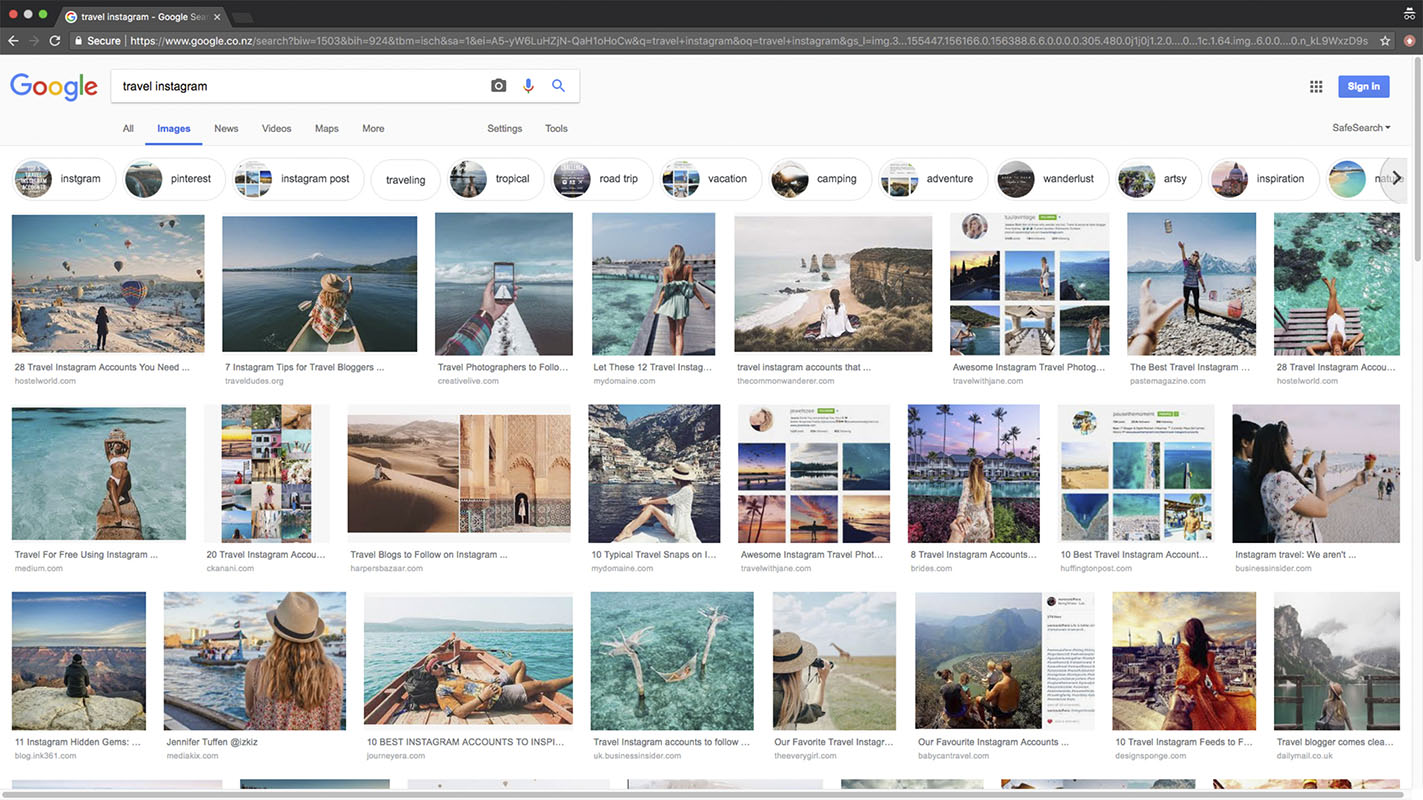Abstract
A commonly held assumption about social media is that because users create their own content such as images, videos and so on and thereby their own representations, social media are largely free from any ideological dispositions imposed from above. Creating images is a discursive practice, mediated by a myriad of social and cultural influences that we encounter in our everyday lives. Like in any other form of communication, certain image sharing practices become more dominant, where they intersect with a range of connotative meanings and their ideological dimensions. Within our current conjuncture of global consumerist capitalism, the dominant cultural order is that of maximizing enjoyment through consumption. This essay puts forth a semiotic reading of a cross-section of travel images shared by users on Instagram to explicate the relationship between travel photography, enjoyment as an ideology and capitalism. It is argued that to travel is not just an activity but it is a commodity that is consumed by us and sold to us by the tourism industry. Contradictions of life under global capitalism remain, with growing inequalities, precarious working conditions, casual job contracts and meagre pays. Material enjoyment remains illusory for many, while the ideological inducements to enjoy finds its outlet in the images we share. When shared on social media for the gaze and ‘likes’ of the viewers, our travel images are not just memoirs of a journey undertaken but also an affirmation of our enjoyment. For the viewers of these images, the enjoyment of others pertaining to consumption is to be envied or held up to an ideal against which the viewers may imagine their own enjoyment. Capitalism demands enjoyment in the form of consumption, and those who cannot enjoy, are ‘free’ to fantasize about such enjoyment in the future. While ‘free’ is the buzzword under neoliberal global capitalism, enjoyment is that kernel that underpins and sustains its ideology.
References
Althusser, L., 1973. Ideology and Ideological State Apparatuses. In: L. Althusser. Lenin and Philosophy and Other Essays. La Pensee: Monthly Review Press. Available at: <https://www.marxists.org/reference/archive/althusser/1970/ideology.htm>. [Accessed on 12. Dec. 2018]
Barthes, R., 1978. The Photographic Message. In: Image-Music-Text. Trans. by S. Heath. New York: Hill and Wang.
Barthes, R. 2000. Mythologies. London: Vintage.
Baudrillard, J. 1998. The Consumer Society: Myths and Structures. London: Sage.
Bauman, Z. 1997. Postmodernity and its Discontents. Cambridge: Polity Press.
Berger, J. 1972. Ways of Seeing. London: Penguin Classics.
Cremin, C. 2009. Never Employable Enough: The (Im)possibility of Satisfying the Boss's Desire. Organization, 17(2), pp. 131–149.
Data Indicator: Worldbank. 2016. The World Bank Website. Available at: <http://data.worldbank.org/indicator/ST.INT.XPND.CD> [Accessed on 12 Dec. 2018]
Debord, G. 1970. The Society of the Spectacle. Detroit: Black and Red Press.
Gerlitz, C., & Helmond, A., 2013. The Like Economy: Social Buttons and the Data-intensive Web. New Media & Society, 15(8), pp. 1348–1365.
doi:10.1177/1461444812472322
Goodwin, I., Griffin, C., Lyons, A., McCreanor, T., & Barnes, H. M., 2016, February.
Precarious Popularity: Facebook Drinking Photos, The Attention Economy, and the Regime of the Branded Self. Social Media+Society, 2(1), pp. 1–13. doi:10.1177/2056305116628889
Google Images. Search words: travel yoga Instagram. 2018. Available at: <https://www.google.co.nz/> [Accessed on 2 Oct., 2018]. Copyright 2018 by Google and the Google logo are registered trademarks of Google LLC, used with permission.
Google Images. Search words: travel Instagram. 2018. Available at: <https://www.google.co.nz/> [Accessed on 2 Oct., 2018]. Copyright 2018 by Google and theGoogle logo are registered trademarks of Google LLC, used with permission.
Google trends. Search words: Solo travel. 2018. Available at: <https://trends.google.com/trends/explore?date=all&q=solo%20travel> [Accessed on 3 Oct., 2018]
Hall, S., 1985. Signification, Representation, Ideology: Althusser and the Post-structuralist Debates. Critical Studies in Mass Communication, 2(2), pp. 91–114. doi:10.1080/15295038509360070
Hall, S., 2005. Encoding/decoding. In: Hall, S., Hobson, D., Lowe, A. & Willis, P., eds. Culture, Media, Language. Pp. 117–127. London, New York: Routledge.
McGowen, T., 2004. The End of Dissatisfaction? Jacques Lacan and the Emerging Society of Enjoyment. Retrieved March 7, 2017, from Project Muse Database
Myunghwa, K., & Schuett, M. A., 2013. Determinants of Sharing Travel Experiences in Social Media. Journal of Tourism and Marketing, 30(1-2), pp. 93–107. doi:10.1080/10548408.2013.751237
Popp, R. K., 2012. The Holiday Makers: Magazines, Advertising and Mass Tourism in Postwar America. [online] Baltimore: Louisiana State University Press. Available at: <http://muse.jhu.edu.ezproxy.auckland.ac.nz/book/16543> [Accessed on 9 May, 2018].
Reilly, A., 2015. Low-cost Labour or Cultural Exchange? Reforming the Working Holiday Visa Programme. The Economic and Labour Relations Review, 26(3), pp. 474–489. doi:10.1177/1035304615598160
White, L., 2010. Facebook, Friends and Photos: A Snapshot into Social Networking for Generating Travel Ideas. In: Sharda, N. Tourism Informatics: Visual Travel Recommender Systems, Social Communities and User Interface Design. New York: Information Science Reference. Pp. 115–129. doi: 10.4018/978-1-60566-818-5
Žižek, S., 1991. For they know not what they do: Enjoyment as a political factor. London New York: Verso.
Žižek, S. (Writer), & Fiennes, S. (Director), 2012. The Pervert's Guide to Ideology [Motion Picture]. Zietgeist Films.
© Membrana Institute and the author(s). All rights reserved.





